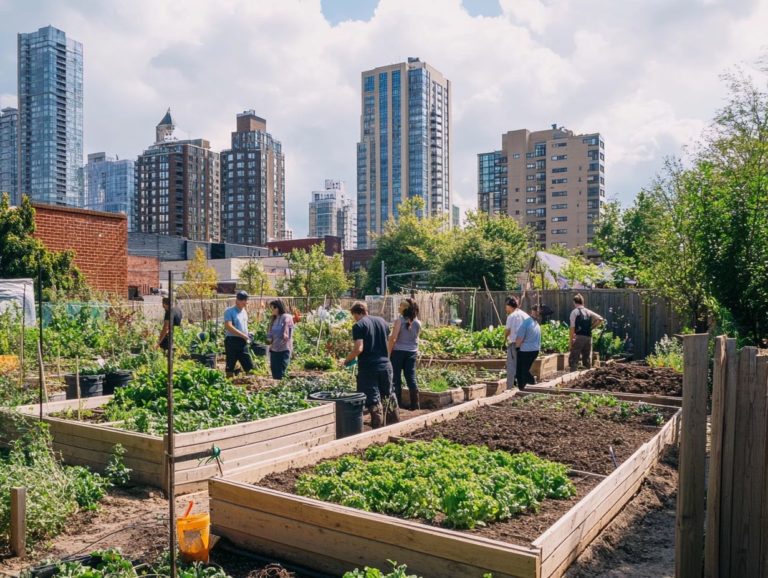What Are the Principles of Permaculture Ethics?
Permaculture ethics lay the groundwork for sustainable living. They emphasize the importance of a harmonious relationship between humans and the natural world, along with the principles of Earth Care, People Care, and Fair Share.
This article explores the core principles of permaculture. It centers on three essential ethical tenets: Care for the Earth, Care for People, and Fair Share, which guide sustainable practices and resource sharing. Discover how these ethics can transform your life and our planet!
Explore how permaculture can reshape your approach to sustainable living. Focus on local needs and renewable resources to inspire a more balanced existence.
Contents
- Key Takeaways:
- Understanding Permaculture Ethics
- The Three Ethical Principles of Permaculture
- Implementing Permaculture Ethics in Practice
- Benefits of Permaculture Ethics
- Challenges and Criticisms of Permaculture Ethics
- Frequently Asked Questions
- What are the principles of Permaculture Ethics?
- What is Earth Care?
- How does People Care factor into Permaculture Ethics?
- What does Fair Share mean in relation to Permaculture Ethics?
- What are some examples of Permaculture Ethics in practice?
- How do the principles of Permaculture Ethics benefit the environment?
Key Takeaways:

- Permaculture is a set of principles that guide sustainable and regenerative practices in agriculture and land management.
- The three ethical principles of permaculture are care for the earth, care for people, and fair share.
- Implementing permaculture ethics in practice can lead to numerous benefits for the environment and society, such as improved food production and community sufficiency, but it also faces challenges and criticism that need to be addressed.
Understanding Permaculture Ethics
Understanding permaculture ethics is vital for cultivating sustainable living and crafting resilient systems. These systems prioritize the well-being of people, the earth, and equitable sharing of resources, in line with the ethical principles of permaculture.
Drawing inspiration from pioneers like Bill Mollison and David Holmgren, along with organizations like the Brighton Permaculture Trust, the principles of permaculture provide a comprehensive framework for tackling local needs and environmental challenges. They highlight the intricate connections within our ecological systems.
The Brighton Permaculture Trust serves as a prime example of these ethical guidelines in practice. It champions ecological balance and community support through innovative methods that embrace renewable resources and responsible food production.
Defining Permaculture and its Principles
Permaculture is a way of designing gardens and farms that work with nature rather than against it. It emphasizes sustainable practices and effective garden layouts to cultivate regenerative systems. This approach draws on a rich tapestry of ecological principles aimed at enhancing food production through innovative garden design while minimizing waste and promoting diversity in gardening methods.
Rooted in the concepts of permanent agriculture and permanent culture, permaculture prioritizes long-term sustainability over quick gains, setting itself apart from conventional agriculture. By embracing core principles like “observe and interact,” you can gain insights from your environment and make informed decisions that boost productivity in sustainable practices.
The principle of “catch and store energy” encourages you to harness renewable resources think sunlight and rainwater as essential elements for maintaining a balanced ecosystem and promoting energy storage. Focus on “obtain yield” to cultivate diverse outputs that nurture your ecosystem!
The Three Ethical Principles of Permaculture
The three ethical principles of permaculture are essential to its philosophy: care for the earth, care for people, and fair share. To understand these concepts more deeply, explore what permaculture ethics and its framework are. Together, these principles form a solid foundation for sustainable communities and meaningful social change.
Established by visionaries like Bill Mollison and David Holmgren, these ethical principles promote environmental stewardship, social equity, and responsible resource sharing. They guide you toward a more harmonious relationship with the world around you while addressing climate change.
Care for the Earth
Caring for the earth highlights the importance of protecting and regenerating our ecosystems through sustainable practices that promote ecological balance. By adopting environmental design strategies, you can use renewable resources while minimizing your ecological footprint and encouraging waste-free practices.
One effective technique is permaculture garden design, a gardening method that follows nature’s patterns. This allows you to grow food in harmony with the environment using small, sustainable solutions. Composting reduces waste and enriches the soil, contributing to biodiversity and creating a thriving habitat for diverse organisms.
Renewable energy solutions, such as solar and wind power, are crucial for reducing reliance on fossil fuels. Switching to these resources leads to cleaner air and water, benefitting everyone.
Focusing on biodiversity ensures that ecosystems remain resilient, enabling them to adapt to changes. These ecosystems provide critical services like pollination and nutrient cycling, which are vital for sustaining life on our planet.
Care for People

Care for people is an ethical principle that revolves around supporting individual and community well-being through self-regulation and feedback mechanisms. This principle promotes social change and resilience by addressing local needs and cultivating robust community support networks.
Communities embrace this ethos through initiatives like urban farms and community gardens. These projects provide fresh produce and serve as essential spaces for social interaction and education. They play a significant role in addressing food insecurity by making nutritious options readily available, empowering residents through hands-on experiences in sustainable agriculture.
By prioritizing social equity, these projects ensure that vulnerable populations have a voice. They reinforce community resilience and nurture a sense of belonging while meeting local needs. Ultimately, these practices contribute to a healthier, more interconnected society that genuinely values everyone’s well-being.
Fair share highlights the importance of ensuring resources and opportunities are distributed equitably. This principle encourages you to recognize your limits and share surplus resources responsibly, fostering the development of sustainable communities.
In practice, fair share comes to life through initiatives that promote collaborative consumption and community engagement. Take community gardens, for instance; they allow you to cultivate and share produce, strengthening social connections and enhancing community sufficiency.
Organizations like food banks exemplify this concept by redistributing excess food from restaurants and farms to those in need. This effectively minimizes waste while addressing hunger and promoting fair share. Workshops and educational programs encourage sharing knowledge and skills, such as in local tool libraries, enhancing resilience and nurturing a culture of support.
Ultimately, fair share serves as a catalyst for unity, empowering you and your community to thrive sustainably through collaborative consumption and resource sharing.
Implementing Permaculture Ethics in Practice
Implementing permaculture ethics in practice requires you to translate those ethical principles into real-world scenarios. You can create tangible examples that showcase sustainability in motion and the importance of environmental design. This can encompass initiatives such as community gardens and urban farms, which exemplify sustainable food production and embody the essence of ecological stewardship.
Examples and Applications
Urban farms and community gardens serve as prime examples of permaculture principles in action. They demonstrate how ideas about nature can be seamlessly woven into urban settings to enhance food security and promote renewable resources while addressing climate change.
By tapping into local needs, these initiatives foster community engagement and elevate environmental awareness.
Take, for instance, the Brooklyn Grange in New York City. This notable urban farm showcases sustainable practices in food production. This innovative rooftop farm transforms previously unused spaces into vibrant sources of quality produce.
Their approach emphasizes sustainable agricultural practices, including organic farming and composting. These methods minimize waste and maximize yield, aligning with the principle of producing no waste.
Of course, challenges like funding and climate variability remain ever-present, requiring innovative solutions and community support.
Similarly, community gardens scattered throughout Detroit do more than just harvest fresh fruits and vegetables. They revitalize neighborhoods and cultivate social connections among residents, addressing local needs and promoting community involvement.
These endeavors illustrate that with collective effort, communities can truly flourish. They underscore the vital role community involvement plays in achieving sustainability and fostering social change.
Benefits of Permaculture Ethics
The benefits of permaculture ethics reach into both environmental and social spheres. They cultivate sustainable communities that flourish through ecological balance and social equity while addressing the challenges of climate change.
By embracing permaculture practices, you can substantially lessen your environmental footprint. This approach boosts local food production and fosters community self-sufficiency, enhancing resilience in the face of climate change.
Environmental and Social Benefits

Experience vibrant biodiversity and improved soil health by adopting permaculture today. The environmental benefits of permaculture practices include effective strategies for climate change mitigation.
On the social side, these practices cultivate stronger community ties and bolster food security. By promoting resource sharing and fostering sustainable living habits, permaculture gives power to both individuals and communities.
Employing techniques such as polycultures and agroforestry growing trees alongside crops you can help create a vibrant and diverse ecosystem.
Take community gardens in urban areas, for instance; they not only boost local food production but also enhance social cohesion. In cities like Detroit, these gardens have transformed neglected lots into lively green spaces, improving air quality while providing fresh produce to residents.
Case studies from countries like Australia demonstrate how integrating permaculture into farming can enhance resilience against climatic extremes. This underscores a profound connection between ecological restoration and community health, illustrating just how impactful your efforts can be.
Challenges and Criticisms of Permaculture Ethics
Despite the numerous benefits that permaculture ethics offer, you may encounter challenges and criticisms that reveal limitations in their implementation and effectiveness.
These obstacles often stem from the complexities of climate change, the diverse socio-economic contexts of communities, and the resistance some individuals have toward adopting new practices.
Addressing Concerns and Limitations
Addressing concerns and limitations in permaculture practices requires you to develop flexible plans that adjust to local needs, engage communities, and integrate ecological principles. By fostering collaboration and sharing knowledge, you can navigate challenges more effectively and enhance the impact of permaculture ethics.
Such approaches empower individuals and build the ability to recover and thrive in changing conditions within local ecosystems. For instance, initiatives that promote educational workshops or community gardens can turn theoretical concepts into practical applications, encouraging active participation from everyone involved.
Successful models like Transition Towns show how localized efforts can achieve significant sustainability goals by integrating diverse voices. By leveraging technology and social media, you can create broader connections among practitioners, allowing for the exchange of insights and inspiration.
By adapting permaculture principles to fit specific environmental and cultural landscapes, you can make a real difference!
Watch this video to learn more about how permaculture can transform communities!
Frequently Asked Questions
What are the principles of Permaculture Ethics?
The principles of Permaculture Ethics are a set of guidelines that govern the ethical and sustainable design of systems to create a harmonious relationship between humans and nature. For a deeper understanding, you can explore the principles of permaculture design, which are based on the three core ethics of Earth Care, People Care, and Fair Share.
What is Earth Care?

Earth Care is one of the core ethics of Permaculture, emphasizing the importance of taking care of the Earth and all its living systems. This includes using regenerative farming practices, reducing waste, and preserving biodiversity.
How does People Care factor into Permaculture Ethics?
People Care is another core ethic of Permaculture that focuses on the well-being of individuals and communities. This means creating systems that support and enhance the physical, mental, and emotional health of people.
Fair Share is the third core ethic of Permaculture, based on the concept of fair and equitable distribution of resources. This includes sharing surplus resources, using resources efficiently, and creating systems that benefit everyone.
What are some examples of Permaculture Ethics in practice?
- Using rainwater harvesting systems to reduce water waste.
- Incorporating companion planting to promote biodiversity.
- Implementing composting methods to reduce food waste and improve soil health.
How do the principles of Permaculture Ethics benefit the environment?
The principles of Permaculture Ethics promote sustainable and regenerative practices that minimize harm to the environment. By caring for the Earth, conserving resources, and promoting biodiversity, Permaculture helps create a healthier and more resilient environment for future generations.






